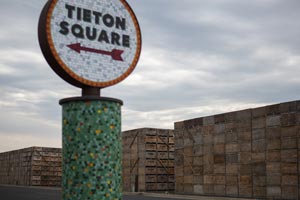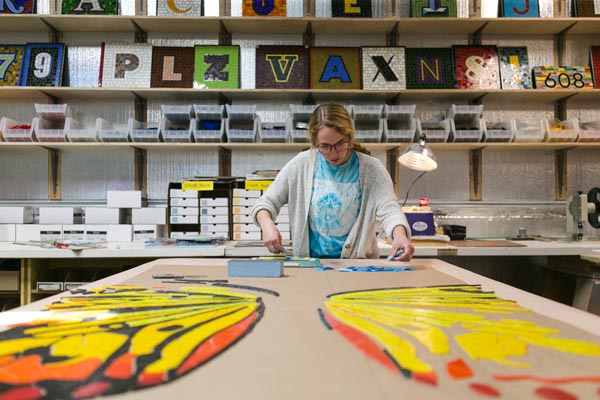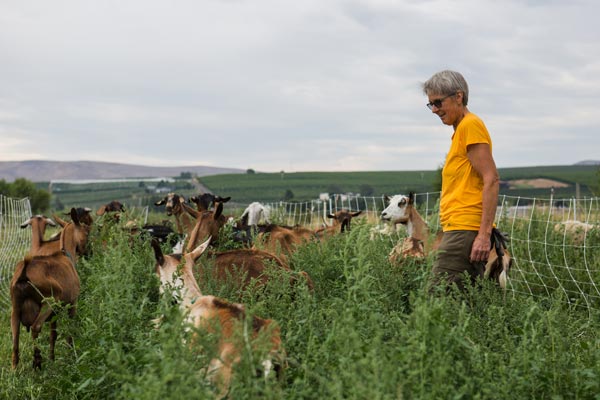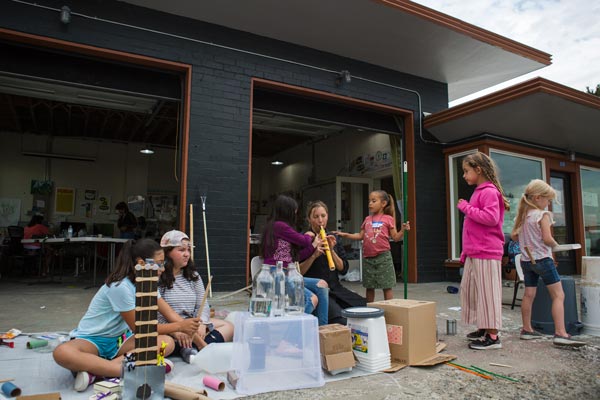By: Sarah Chase Shaw
Grappling with change, the City of Tieton works to foster a sense of belonging by focusing DEIB efforts on the rural community’s youth.
In the mid part of the 20th century, the City of Tieton (pronounced TIE-uh-tuhn) was a prosperous, rural-agricultural hub. It had a railroad link, a dance hall, a bowling alley, and a soda fountain where residents gathered regularly to catch up on news and gossip. Consolidations in the Yakima Valley fruit industry changed all that, with an exodus of workers leaving the community behind in favor of larger cities like Yakima, located about 20 minutes away.

Tieton Arts & Humanities’ Mosaic Project produced a series of mosaic directional signs for the city, inspired by the New York City subway system, with a $50,000 Our Town grant from the National Endowment of the Arts.
Credit: Emree Weaver/Yakima Herald-Republic
Recently, however, Tieton has experienced something of a rebirth as a destination for artists, hobby farmers, and urban refugees, thanks largely to the entrepreneurial spirit of newcomers like Ed Marquand, a Seattle fine arts book publisher who in 2005 founded Mighty Tieton, an artisan business incubator that sponsors art exhibits, antique shows, educational retreats, and special events at its warehouse in town. Today, it’s a big draw for both tourists and locals. Giant fruit warehouses that sat empty for more than a decade now are open day and night with art installations, artists' studios, and even a workshop occupied by Trimpin, the sonic-sculpture artist responsible for the electric guitar tower at Seattle’s MoPop (Museum of Popular Culture). Another warehouse has been converted into high-end lofts. The Mexican Day of the Dead festival is a big draw, particularly since more than 70 percent of the population is Hispanic.

Artist Serena Martian works on a project in the mosaic studio at the Mighty Tieton Warehouse in Tieton.
Credit: Emree Weaver/Yakima Herald-Republic
Some longtime locals argue that it’s too much, too soon, and the small-town charm of Tieton is being lost in favor of an economy that revolves around big-city expectations like trendy food and drink venues, eclipsing the fact that 70 percent of all apples harvested in the U.S. are still grown within a 100-mile radius of Tieton. Add to that the wave of teleworkers earning big paychecks that arrived during and after the pandemic, depleting Tieton’s already sparse inventory of housing and ratcheting up real estate prices, and little Tieton has a big-city headache on its hands.

Ruth Babcock tends her goat herd at Tieton Farm & Creamery, a solar-powered farm that produces artisan cheese from locally raised sheep and goats.
Credit: Emree Weaver/Yakima Herald-Republic
“There’s always been plenty of work, but now with the influx of other interests, housing for seasonal labor and permanent residents is hard to come by,” notes lifelong resident and Mayor, Dewane Ashbrooks (he/him). Some employers have added housing for local workers as part of the cost of doing business. More recently, Catholic Charities, in partnership with the city, has developed a number of subsidized apartments and homes to house the city’s burgeoning population—estimated at close to 1,400 per the 2020 Census, a 16 percent increase from 2010—with living-wage rents that scale up or down depending upon income level.
Enter Lupita Carrillo (she/her), one of Tieton’s two Latino council members, who in addition to her role in local government, serves on AWC’s DEIB Cabinet. It was a position she was eager to accept, she says, because Tieton, lacking an official DEIB (Diversity, Equity, Inclusion, and Belonging) plan or program, needs someone who can serve as a liaison for community members of all backgrounds, and help foster a sense of belonging.
“At some point, I hope that we’re able to see more of the makeup of our city represented not just on our council but in larger leadership roles throughout our community,” says Carrillo. As donor engagement director at the YWCA Yakima, it’s no surprise that she’s an advocate for Tieton’s youth, who, in search of a more diverse community tend to gravitate to Yakima, where opportunities and dedicated safe space for the LGBTQIA+ community and other interest groups abound.
To that end, the city recently partnered with the Highland School District and local nonprofit Tieton Arts & Humanities to establish creARTe, an afterschool and summer program that offers art classes for children and teenagers taught in both Spanish and English. As a private citizen and public official, Carrillo assumed a leadership role with Young Life, a national non-denominational ministry geared towards youth that in Tieton focuses primarily on students in middle school through high school and teen parents.

Kate Hotler, director of Tieton Arts & Humanities, makes musical instruments out of found materials with students during a CreARTe summer program in Tieton.
Credit: Emree Weaver/Yakima Herald-Republic
Tieton also faces some unique challenges when it comes to fostering a sense of inclusion and belonging. All summer long, the city’s two parks bustle with a slew of activities—from quinceañera parties and barbecues to soap box derby races, but once winter sets in, Tieton lacks an indoor space large enough to host a town hall or community celebration. Then there’s the city’s spotty internet service, which makes fostering a sense of belonging—whether getting the word out about a community potluck or just staying in touch with the goings on in the wider world, a constant challenge. “If it’s windy, raining, or snowy, we don’t have internet, and wind is constant for us,” Carrillo says. “You would never think the wind would keep us from being as equitable as we would like to be.”
But lately, when it comes to realizing that elusive fourth goal of the DEIB equation by focusing on the next generation, the winds of change also seem to be blowing in Tieton’s favor.
“Kids are the future of this community, and we want them to live healthy lives and to be productive adults,” Carrillo says. “Our goal is to give them the opportunities they need to feel like they belong here and can be successful.”